
On May 25, 2018, the first Peking University Ocean Forum was held at Overseas Exchange Center by Peking University Institute of Ocean Research. With the theme of "Peking University Ocean Forum: the Word and China", this international academic forum aims at promoting the study of ocean around the world to contribute to the development and prosperity of human kind.
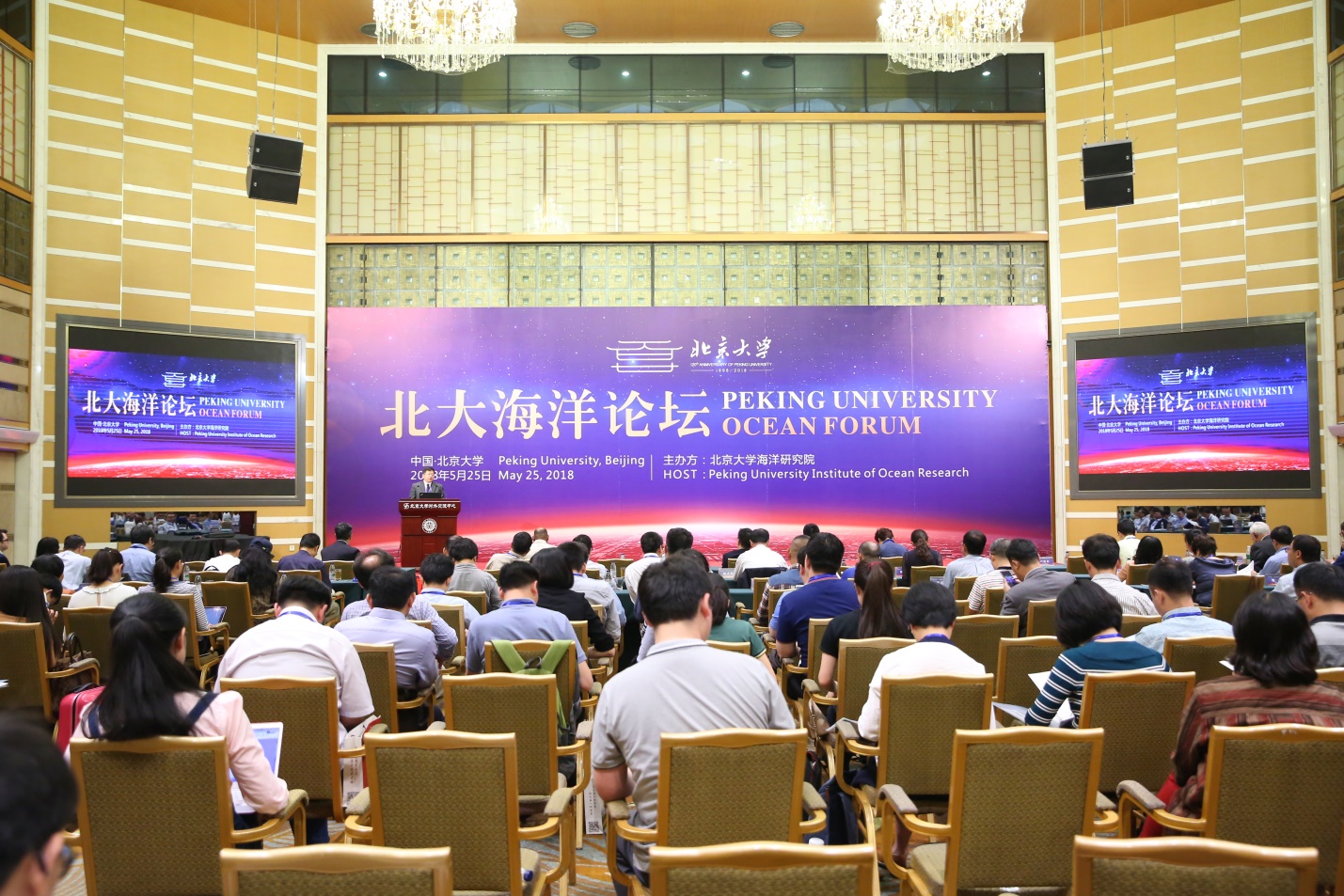
"Peking University Ocean Forum"View
The conference were divided into two parts. First, Zhang Hongtao, counselor of State Council, Wu Lixin, member of CAS, Chen Dake, member of CAS and Lu Hailong, professor of Peking University were invited to give keynote speeches as special guests. Then came the parallel forums with the prominent features of interdiscipline and multiculture. The forum centered around two topics: "Smart Ocean: Equipment and Innovation" and "Transcending Maritime Geo-strategic Competition: Theories and Practices". Over 200 participants from China, the United Kingdom, the United States, Japan, Singapore, Malaysia, and Norway gathered here and discussed the ocean problem together.

Professor Wang Lei host the forum
At the beginning of the conference, Wang Lei, the vice dean of Peking University Institute of Ocean Research extended a warm welcome to the guests. He explained the purpose of holding this forum. On the one hand, this forum aims at celebrating the 120th anniversary of Peking University. On the other hand, it serves as the starting point of a series of activities concerning "Peking University and Ocean" . It builds an open platform for the discussion on the improvement of oceanography in Peking University and the sustainable development of ocean in China and the world. Also, it integrates national and global resources and help the construction of the state ocean strategy.

Professor Zhang Dongxiao, Dean of Peking University Institute of Ocean Research
Professor Zhang Dongxiao, Dean of Peking University Institute of Ocean Research, delivered the opening speech. Professor Zhang stressed that being the platform for ocean research, the mission of Peking University Institute of Ocean Research is to develop the oceanography in Peking University. It should shoulder the responsibility of the construction of the ocean platform in Peking University, and provide support for the state ocean strategy. He urged to build the institute with distinctive characteristics of Peking University. Finally, Professor Zhang emphasized the responsibility and accountability as members of Peking University, and encouraged the devotion and contribution of ocean researchers from Peking University.

Zhang Hongtao
The conference started with the speech on the topic of "Ocean and Resource Management" given by professor Zhang Hongtao, the counselor of State Council and researcher in the Ministry of Natural Resources. Zhang pointed out that the critical point of the development of marine resources is to advance the oceanographic technology and improve the capacity for innovation. That also helps to develop the marine economy and promote the marine environmental protection. He highlighted that an effective plan of marine technological innovation needs to be made, and researchers should mainly focus on the studies of the deep water and the green and security technology, especially on the research and the core technology development in the marine economy transition period.

Wu Lixin
Academician Wu Lixin, Director of Qingdao Pilot National Laboratory for Marine Science and Technology, Vice President of the Ocean University of China gave a speech with the topic of "Transparent Ocean and Human Destiny Community". He delved into three main challenges human beings are faced with: "the regulation of climate with the help of deep-sea and ocean", "the cascade of marine multi-energy" and "the material and energy circle in the extreme environment of the deep sea". He pointed out that the joint efforts of scientific institutions worldwide are vital to the implementation and promotion of the Belt and Road initiative. He also pointed out that the construction of smart ocean needs big data support, and the development of marine technology in the 21st century should be achieved with interdisciplinary research.

Chen Dake
Academician Chen Dakegave the speech of "Ocean Environment Monitor, intensive study of Chinese Ocean, and the construction work in the North and South Poles" under the topic of "Perspectives on Polar Ocean Sciences". He suggested that the polar oceanic science is a crucial part of the Earth system, and it might bring about significant scientific breakthrough and the leapfrog development of the oceanography and geoscience in China. China will play an essential role in the international research project SOOS and MOSAiC, and thereby greatly enhancing our right to speak in the Antarctic Ocean and the Arctic Ocean.
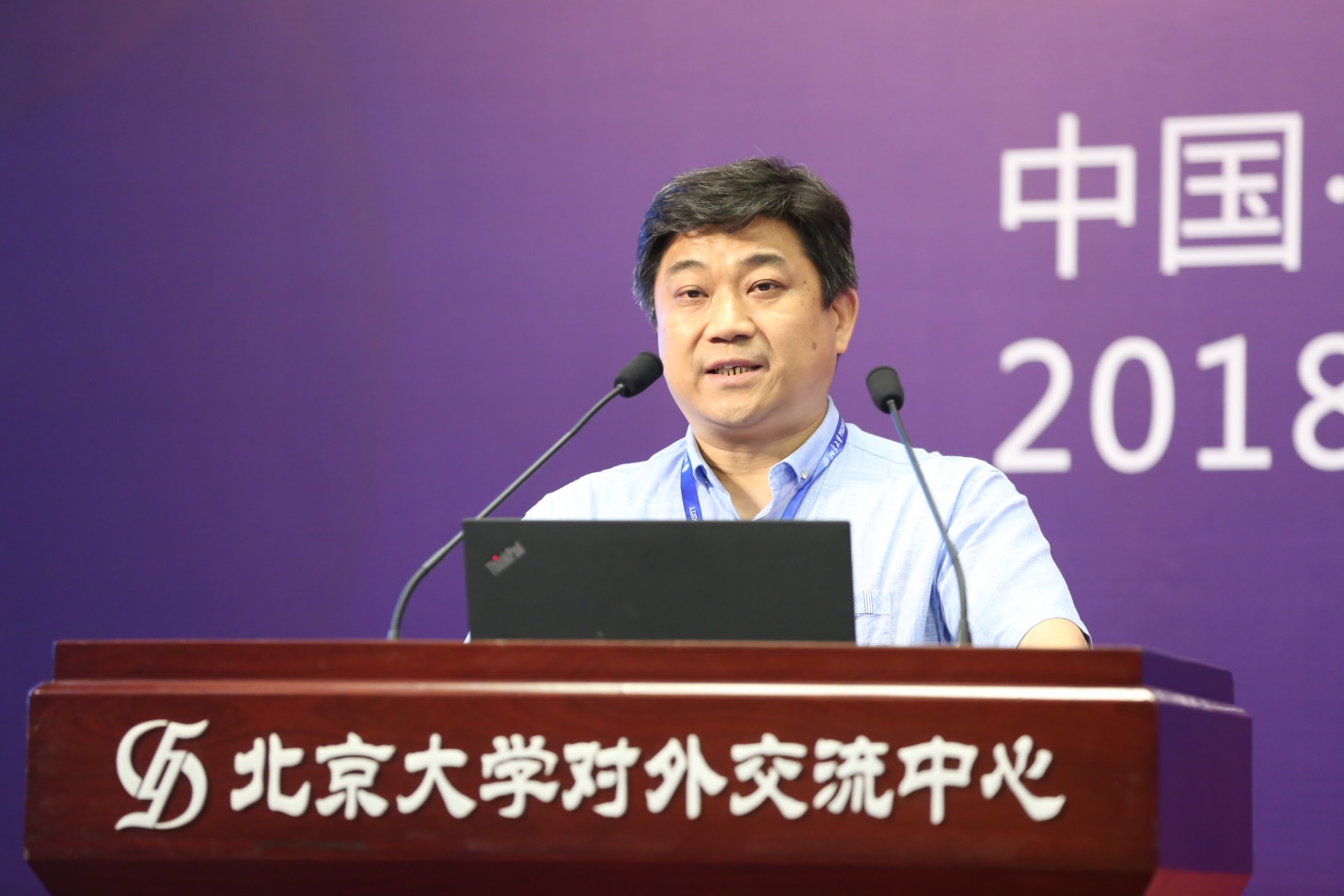
Lu Hailong
Lu Hailong, professor from Peking University Institute of Ocean Research and College of Engineering gave the speech on "Introduction of Natural Gas Hydrate". He introduced the fundamental knowledge of gas hydrate and the drilling method like decompression, heating, injection, and carbon dioxide substitution. In China's first exploitation of gas hydrate in 2017, Peking University, as one of the four core units, was fully involved in this program. He revealed that new technology on exploiting gas hydrate would be conducted next year.

Keynote Forum 1
"Smart Ocean: Equipment and Innovation"
This parallel forum was hosted together by Zhang Min, research Professor from Peking University Institute of Ocean Research, and Zhang Xinrong, professor from Peking University Institute of Ocean Research and College of Engineering.
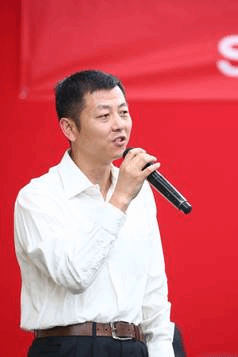

Zhang Min, Zhang Xinrong

Zheng Mei
A general introduction of marine science and engineering at Peking University was made by Zheng Mei, Vice Dean of Peking University Institute of Ocean Research, and professor of College of Environmental Sciences and Engineering. She introduced the study of atmospheric pollutants over ocean from three perspectives: current status of terrestrial atmospheric metal pollution, overview of China's marine metal research, and online data distribution and source analysis of marine atmospheric metals.


Seeram Ramakrishna, Cui Weicheng
Seeram Ramakrishna, Academecian of UK Royal Academy of Engineering and Singapore Academy of Engineering, introduced the application of the lightweight cables made by carbon material employed as the electric conductor in the offshore areas. Cui Weicheng, Professor and Director of Hadal Science and Technology Research Center of Shanghai Ocean University, introduced the supporting role of all-water all-depth research vessel for Smart Ocean and analyzed the importance of it.


Sun Weibin, Li Qingping
Sun Weibin, expert from China National Petroleum Corporation introduced the marine electromagnetic exploration technology. He suggested that the ocean electromagnetic prospecting technology should be developed so as to increase the success rate of drilling, and lower the risk of drilling at the same time. Li Qingping, Chief Engineer of China National Offshore Oil Research Institute, analyzed the status and challenges of deep-water engineering technology and equipment.


Wang Kelin, Guo Peijun
Wang Kelin, professor from Victoria University in Canada, discussed how to predict the occurrence and natural hazards on the seabed through cooperation and construction of submarine detection systems from the perspective of geodynamics. Guo Peijun, director of R&D department of Shanghai Honghua Offshore Oil and Gas Equipment Co. Ltd gave a specific introduction of the new offshore LNG energy equipment.

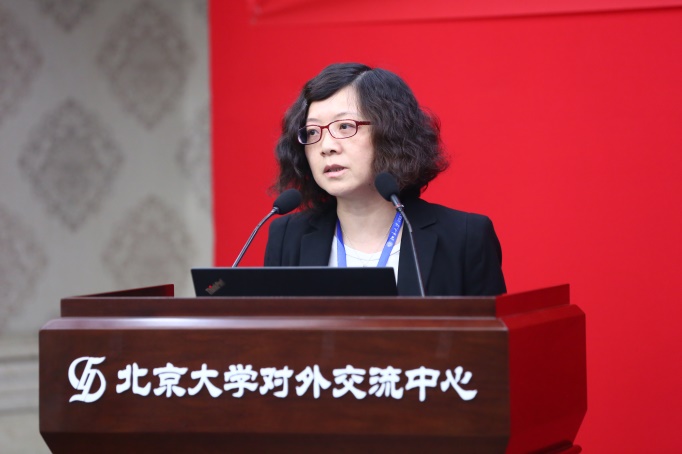
Hu Qiang, Xie Jing
Hu Qiang, an expert of the "Thousand Talents Program", presented the theme report of "Opportunities and Challenges of Marine Microalgae Development in Nutrition, Health, and Marine Aquaculture". He pointed out that the development of marine microalgae biomass resources is among the major national demands. We need to further strengthen the collaborative innovation of industry, education and research, and should focus on establishing communication and cooperation mechanisms with governments and industry associations. Professor Xie Jing, Dean of College of Food Sciences & Technology of Shanghai Ocean University, introduced the innovation and development on key technology development and equipment of low temperature logistics for aquatic products.


Shi Hongda, Niu Qingshan
Shi Hongda, Executive Vice Dean of the Graduate School of Ocean University of China, introduced the history of development and utilization of ocean energy since the 1970s in China, and analyzed the problems, solutions and challenges in the process of ocean energy development. Niu Qingshan, distinguished professor of "Thousand Talents Program" of China and University of Petroleum, introduced the preparation and application of the key equipment technology of modern seawater desalination.



Xie Yuefeng, Liu Jun, Wang Jin
Xie Yuefeng, professor from "Thousand Talents Program" of China and Tsinghua University, Professor Liu Jun from Jilin University, Wang Jin, professor from "Thousand Talents Program" of China and Shanghai Jiaotong University introduced the impacts of wastewater generated from shale gas production on drinking water supply, the past and current development of the underwater acoustic sensor network, and deep-water technology development, respectively.
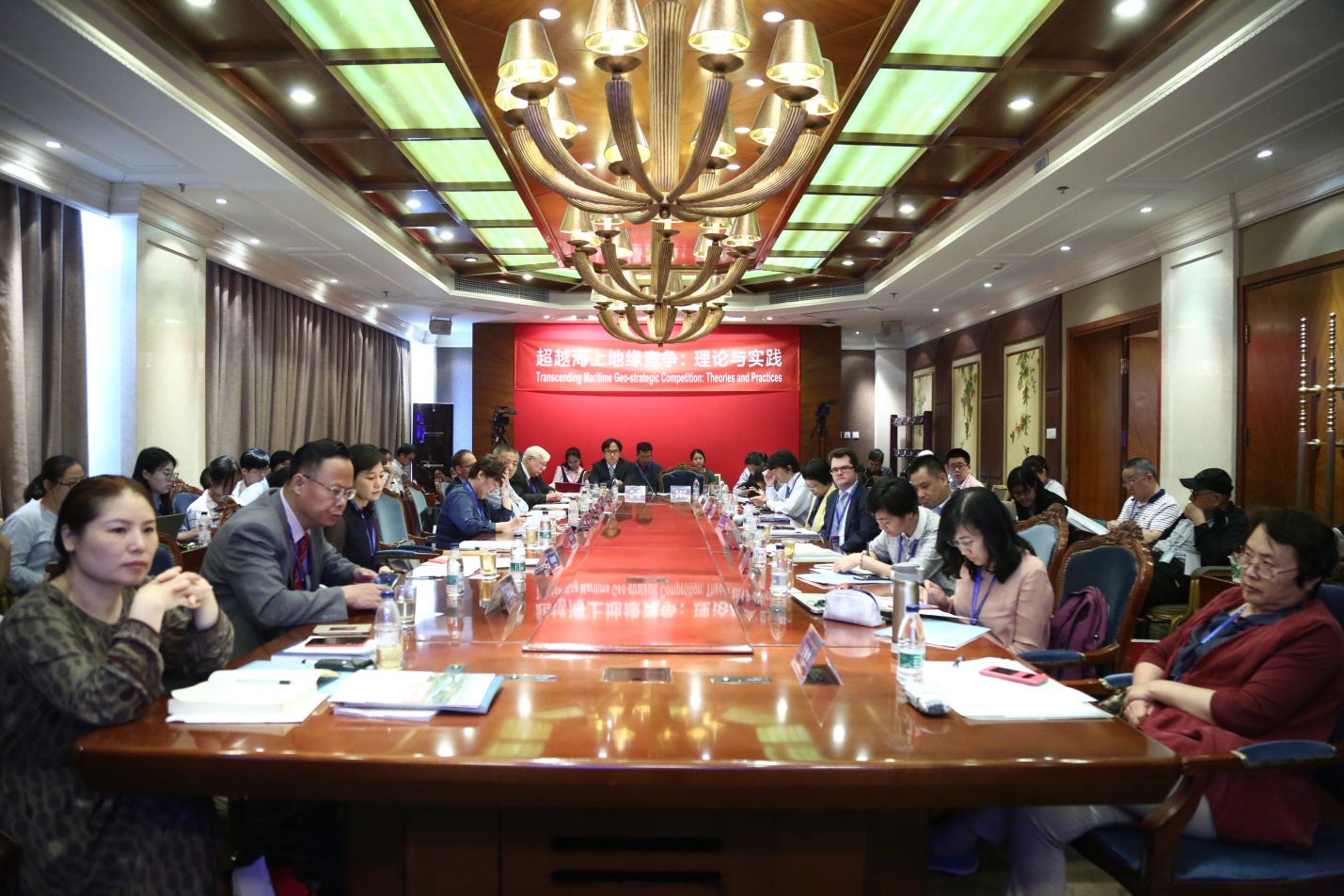
Keynote Forum 2
"Transcending Maritime Geo-strategic Competition: Theories and Practices"
This keynote forum was co-chaired by Hu Bo, research professor from Peking University Institute of Ocean Research, and Zha Daojiong, professor from Peking University School of International Studies. Nearly 20 experts and scholars from China, the United States, Japan, the United Kingdom, Norway, and Malaysia have conducted discussions on topics such as the reality, causes, and trends of global maritime geo-strategic competition.

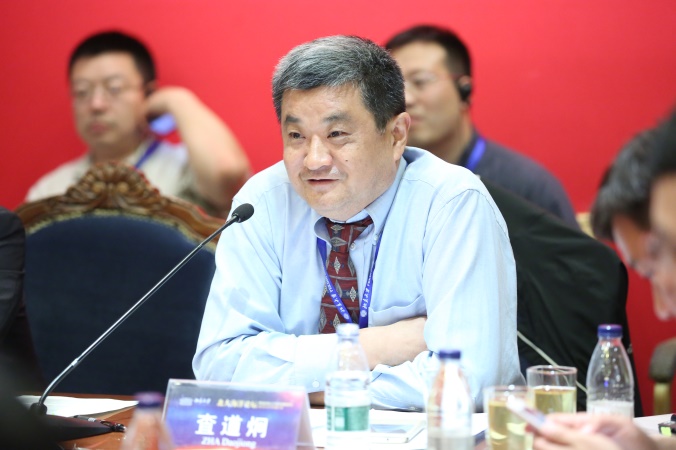
Hu Bo, Zha Daojiong
The participating experts agreed that global maritime geo-strategic competition will be intensified and China's status and role will be highlighted. The setbacks of economic globalization, the sharp changes in the balance of power, and the fermentation of hot issues on the sea have made the conflicts of "great competition in big countries" difficult to be avoided of. Maritime confrontation is becoming the most important content of global geo-strategic competition. Professor Øystein Tunsjøfrom Norway believes that the power gap between China and the United States continues is to shrink. However in the foreseeable future, there is still a big gap. As far as comprehensive strength is concerned, China may become a country that poses a potential strategic challenge to the United States at sea in the future. The gap between other maritime powers and China and the United States will become larger and larger, and a bipolar structure between China and the United States may be formed at sea to some extent.
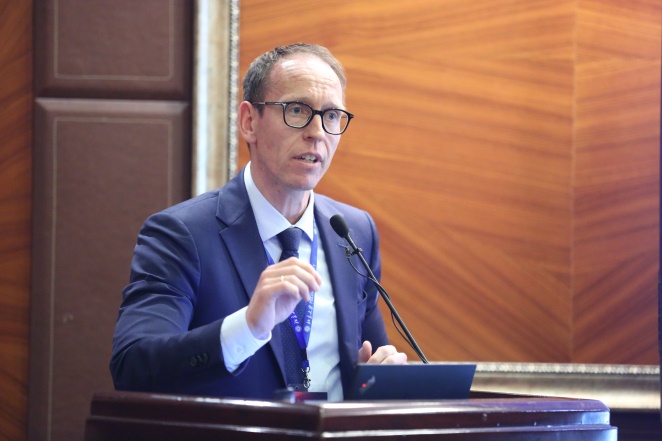
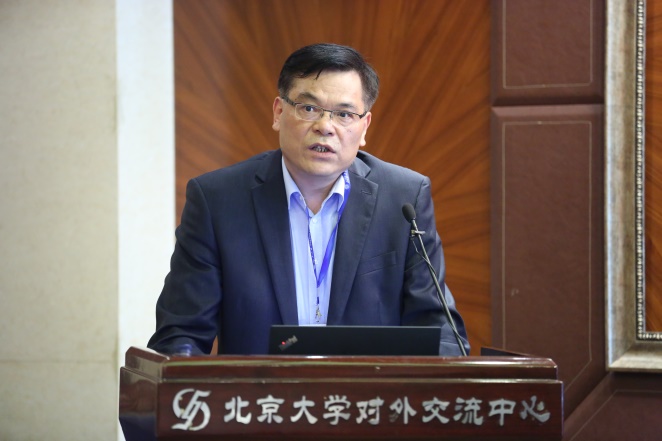

ØysteinTunsjø, Fu Mengzi, Zhao Qinghai
Fu Mengzi, Associate Dean of the China Institutes of Contemporary International Relations, said that in the field of global ocean governance, China actively promotes the construction of a global marine destiny community. China has been advocating the cosmopolitanism conception since ancient times, and believes that the global marine destiny community is characterized by peace. The open economy we are implementing requires a stable ocean environment. However, China still has many shortcomings in ocean governance. Necessary support need to be provided for our participation in global ocean governance through the development of the marine economy, as well as the promotion of scientific and technological innovation, the enhancement of marine equipment manufacturing, and the strengthening of environmental protection. In the end, we will build the sea power through peaceful development and win-win cooperation. Zhao Qinghai, chief editor of "International Studies", recounted the connotation of China's new ocean view, and reiterated the meaning of "building the sea ofpeace", that is, to strengthen cooperation with relevant countries on jointly safeguard freedom and safety of maritime navigation. Marine partnerships and sea channels should be build up to develop marine economies, employ marine resources, explore the marine mysteries, and contribute to the expansion of international ocean cooperation.
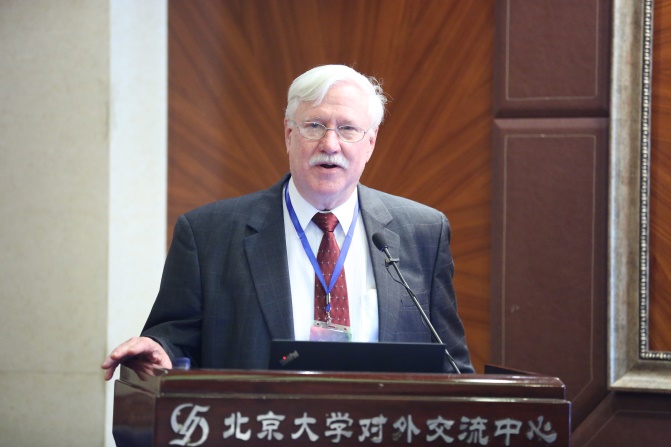

Stanley Byron Weeks、Atsushi Sunami
Dr. Stanley Byron Weeks from the United States also said that with the current situation of increasing international maritime competition, countries need more communication and cooperation to alleviate and control the regional tension. Atsushi Sunami, director of the Japan Ocean Policy Research Institute, mentioned of Japan's third phase of basic plan on ocean policy that Japan not only emphasizes international cooperation, but also increases scientific observation, monitoring, and marine environmental protection, marine law enforcement and marine rescue. Dr. Ei Sun OH, former political secretary of the Prime Minister of Malaysia and Principal Consultant of the Malaysian Pacific Research Center, explored the opportunities and challenges for maritime cooperation from the perspective of the "Belt and Road" relationship with Southeast Asia. Dr. Ei Sun OH believes that the rapid growth of trade in the South China Sea region is very important for Asia and the regional economy of the world. The countries around the South China Sea must actively cooperate in all aspects, such as shipping, energy and mineral resources development, fisheries and etc. Although the cooperation will be accompanied by political and security problems, as long as the countries make up their minds to join hands in joint patrolsto combat terrorism and crime, and jointly fight against natural disasters, peace and prosperity in the South China Sea shall be guaranteed.

James Bosbotinis, Yao Yunzhu
Dr. James Bosbotinis from the UK mentioned maritime security issues while advocating international maritime cooperation. He argued that the rise of new naval forces would lead to the reorganization of the global strategic landscape. General Yao Yunzhu, former director of the Sino-US Defense Relations Center of PLA Academy of Military Science, expressed his concern about the safety of maritime navigation in the Asia-Pacific region. She said that pirates, natural disasters, wars or military conflicts at sea might make it impossible to ensure the smooth passage of sea traffic. Since the division of maritime boundaries is much more complicated than land demarcation, maritime delimitation disputes between the Asia-Pacific countries will be a long-term challenge.

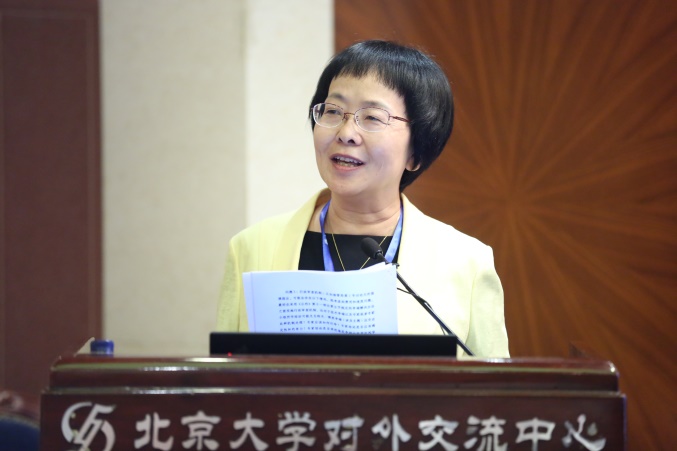
Zou Keyuan, Wu Hui
Zou Keyuan, professor from University of Lancashire, UK, gave a report on the law warfare and conventional warfare in the South China Sea. Zou believes that playing law warfare is better than fighting a real war. Law should be applied as a sharp weapon to pursue the legal rights of the country. Professor Wu Hui, Associate Dean of the School of International Relations, gave a speech on "International Seabed System and Practices". Wu provided the legal norms that have been accepted by the international community, and mentioned that the international submarine regional system is developing in an optimistic direction. She believes that China must not only actively respond to international law, but also participate in the process of enacting international law and strive to defend China's rights itself.
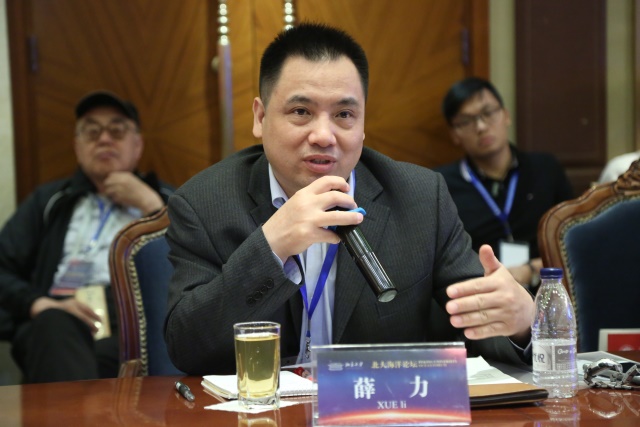
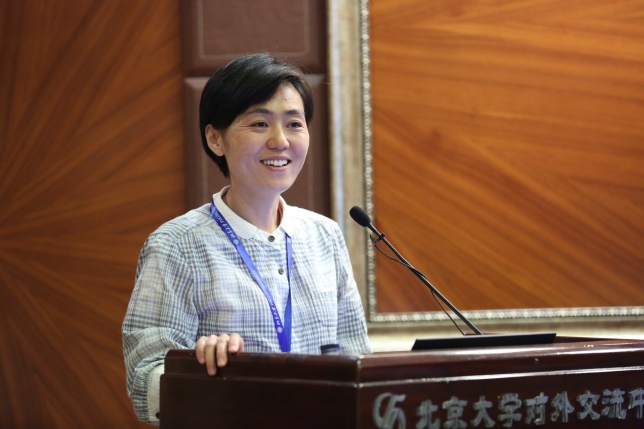
Xue Li, Liu Lin
Dr. Xue Li, research professor at the Institute of World Economics and Politics of the Chinese Academy of Social Sciences, expressed his views on the competition and cooperation between the US-Indian strategy and the ASEAN centrality. He believes that competition between China and the United States is fierce and the ASEAN's centrality will be weakened over the competition between China and the United States. Dr. Liu Lin believes that the goal of the India-Pacific strategy is that the United States wants to maintain its geo-strategic advantage in the Indo-Pacific region and prevent regional military conflicts that are not beneficial for United States. The manifestation of the US-Indian strategy on the South China Sea issue is the return of geo-strategic competition. It uses aligned approach to attract more countries and further distract China's influences.
The host Professor Zha Daojiong, concluded that in discussing the issue of ocean security in the Asia-Pacific region, Chinese or international scholars should innovate on the issues of communication and governing mechanisms.


Ei Sun OH, Hou Ang'yu
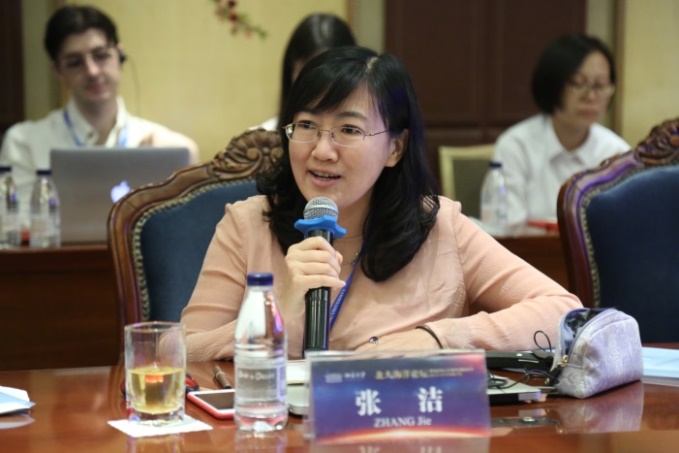
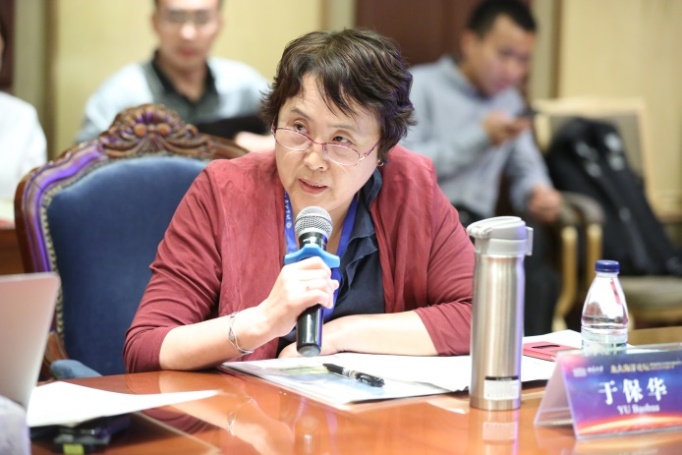
Zhang Jie, Yu Baohua

Pang Zhongying